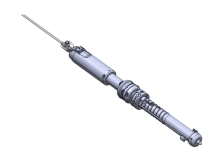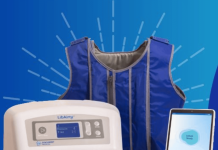A small but mighty team in Atlanta is tackling one of medicine’s biggest challenges: cutting postoperative pain while reducing opioid use.
Shyamy Sastry and his team at the medical device startup Synaptrix, Inc. have developed a proprietary system NOVABLOC™, which is looking to bring new options to the modern pain management world. Its human feasibility studies have demonstrated more than 20 days of pain relief with a single treatment.
Related: Open Bionics receives £600K funding to expand access to prosthetic products
The startup says it is “committed to reducing opioids” while bringing more user-friendly options to the pain management space.
“Modern day treatments for postoperative pain management are largely insufficient. They are either plagued by short-lasting pain control, limit physical rehabilitation, or invite opioid use,” said CEO Sastry. “The NOVABLOC™ system is a groundbreaking neuromodulation technology designed to deliver 20+ days of pain relief without impacting motor function or touch. Altogether, the system treats postoperative pain for days to weeks while promoting rehabilitation and reducing the need for opioids.”
As Sastry explained to Hypepotamus, neuromodulation is a “treatment that uses electrical or chemical stimulation to modify neural activity.” For NOVABLOC, that means delivering “electrical stimulation to selectively reduce neural activity transmitted by pain fibers.”
The Atlanta-based startup, currently made up of three employees, recently caught the eye of investors.
The team announced a $10 million Series A last week from lead investor Durham-based Hatteras Venture Partners.
Raleigh-based RexHealth Ventures, Alpharetta-based Avanos Medical, and Portal Innovations (which has a large and growing presence in Atlanta) also participated in the round.
Sastry told Hypepotamus that Synaptrix spun out of the medical device company Avanos.
“We met our lead investor through our Chairman Bob Crutchfield. Hatteras introduced us to RexHealth and others,” Sastry added.
The NOVABLOC™ system will initially be studied for patients undergoing total knee arthroplasty (TKA) procedures. Sastry said that the funding will go towards a “pivotal study, regulatory submission, and commercialization of the company’s proprietary NOVABLOC™ system.”
Atlanta’s life science, medical, and healthcare technology ecosystems has been growing over the decades, with new developments like Science Square. The city is also home to the CDC, two medical schools, and the top ranked biomedical engineering program in the country. It is also home to three R1 research institutions – Emory, Georgia Tech and Georgia State — making it a strong hub for medical device innovation.
“We find our network in Atlanta forming very well ranging from the orthopedic community to our engineering support. We also find Atlanta to be an easy, central location for our out of town investors, team members and support staff,” Sastry told Hypepotamus.




